What is the Difference Between DevOps and DevSecOps?
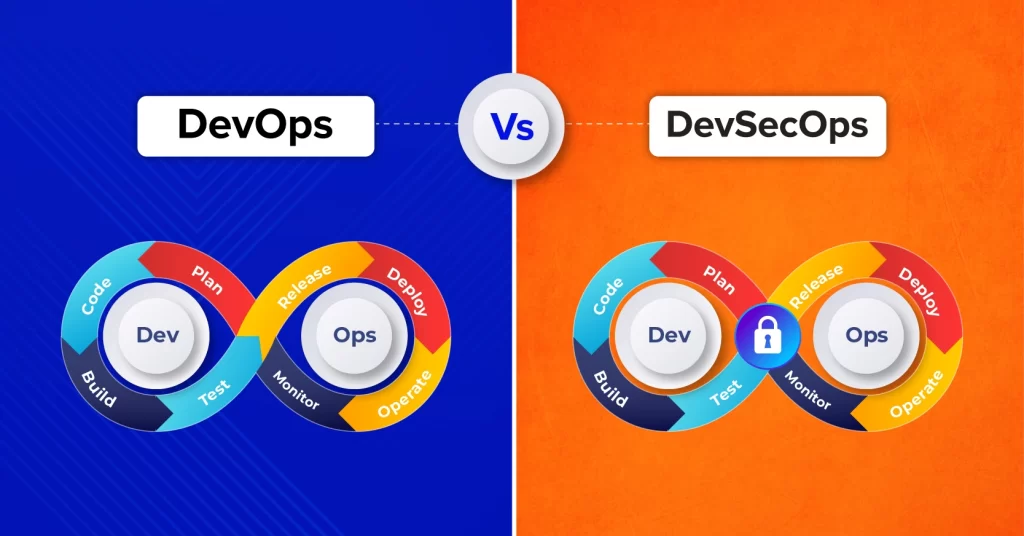
If you’re watching the information technology space, there are high chances that you’ve heard of these terms — DevOps and DevSecOps.
Having been around for more than a decade now, these aren’t new technologies. But it’s only in the last few years or so that these have become sort of Buzzwords.
What exactly are the factors that necessitate businesses to increasingly turn towards DevOps and DevSecOps?
Well, the reasons are aplenty. But, the advent of DevOps services fundamentally changed software development processes. It introduced faster software development and deployment practices. This shift has enabled organizations to achieve better results in shorter timeframes, creating a ripe environment for DevOps to prosper.
Today, the domination of DevOps and DevSecOps is so elaborate that together, they account for approximately 47% of the market share in software development methodologies (Statista).
So, in the next five minutes, we will understand everything about DevOps vs DevSecOps — the similarities, differences, etc.
Let’s start with the most elementary question.
What is DevOps?
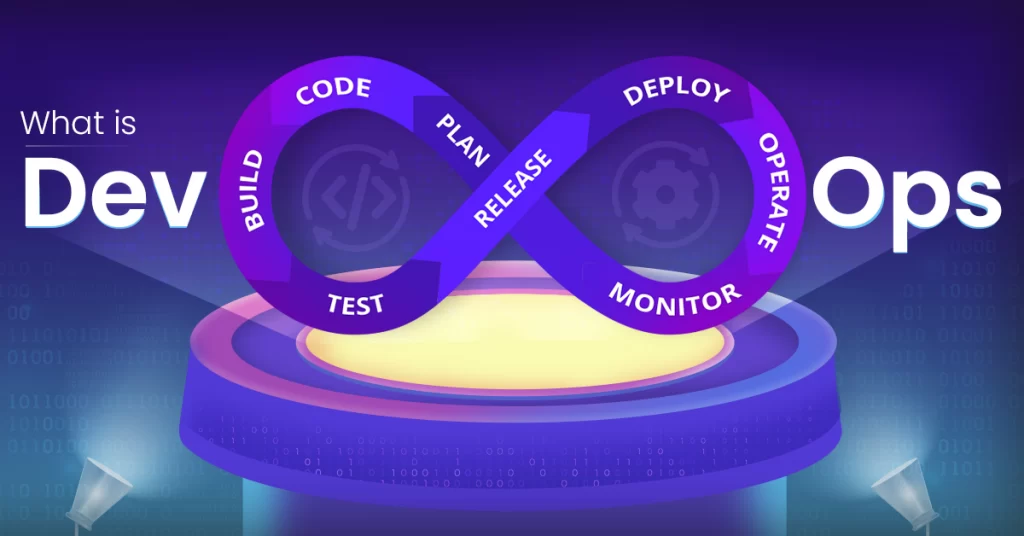
The term DevOps might sound unusual, but its core idea is straightforward. Traditionally, development and operation teams have operated in separate “silos.” DevOps challenges this norm by merging these teams.
In short, as the name suggests, DevOps is a combination of “Development” and “Operations.” It is a methodology that promotes integration between the development and operations teams. This integration further leads to better coordination and efficiency in delivering customer value.
For a very long time, software development processes were fraught with age-old methods that promoted ‘siloization’, resulting in a delayed software release, inadequate coordination between teams, and poor performance and security updates.
But, DevOps introduced a fresh approach to software development, testing, and deployment. It addresses some of the most common and pressing business challenges like delays in software release, poor coordination between developers and operators, and sluggish updates of features.
By integrating tools, processes, and teams and emphasizing automation, DevOps expedites the development and delivery of software products.
So, it can be safely concluded that DevOps service is more than just a method. It is a cultural shift that encourages collaboration between development and IT operations.
Adopting DevOps practices instills a collaborative ethos within an organization, leading to a more effective and streamlined development cycle.
Let’s move to DevSecOps, where the integration of security practices is paramount, creating a balanced approach in the Devsecops vs DevOps debate.
What is DevSecOps?
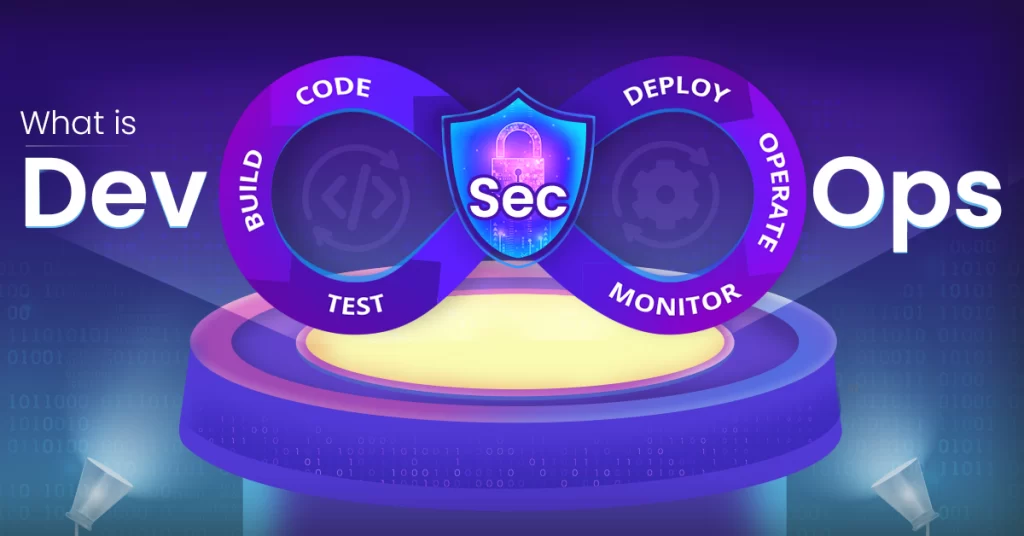
As DevOps evolved with time and with the rise of cloud and cloud-based services in businesses, security increasingly started to become a major concern. Of course, DevOps removed the barriers between software development and operations. This helped businesses shorten their software development lifecycles without a doubt but at the cost of security.
Now you have the answer to “What does the term DevSecOps refer to?”. Now you have to figure out how we tap into the advantages that DevOps has to offer while also addressing the security question. DevSecOps is the answer.
How do we tap into the advantages that DevOps has to offer while also addressing the security question? DevSecOps is the answer.
DevSecOps enhances the DevOps framework by incorporating security as a fundamental element throughout the development cycle. Security is the most important element that differentiates DevSecOps from DevOps, as it adds an extra layer of security within the framework.
Within DevSecOps, security is a critical factor. It is embedded in every stage of the software development and deployment process. This approach is particularly pertinent in cloud environments, where security and compliance are essential prerequisites.
In the above, you understand clearly what are DevOps and DevSecOps. Now you are going to their similarities and differences in detail, examining the nuances of what is devsecops vs DevOps.
DevOps vs DevSecOps: What are the Similarities?
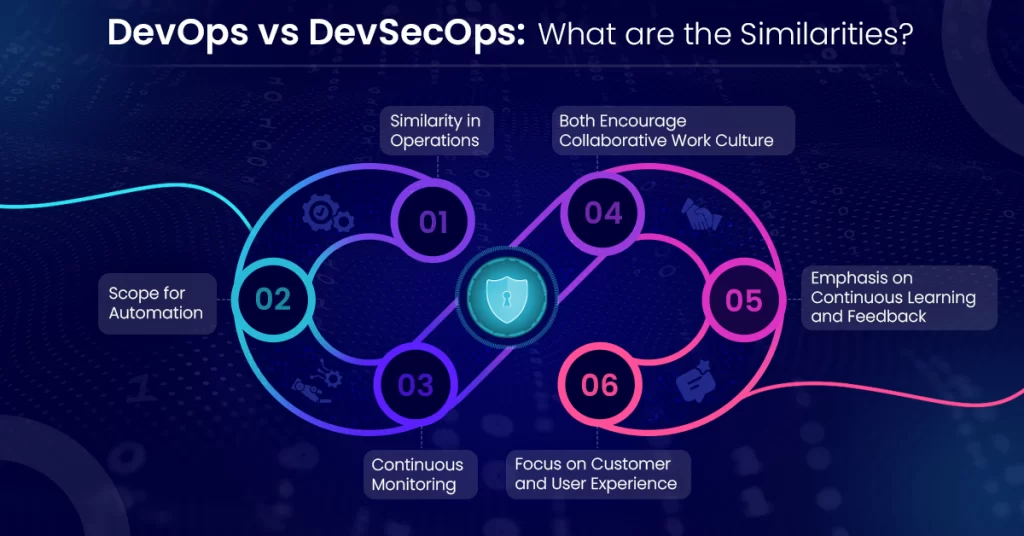
DevSecOps evolved from DevOps, and it is quite obvious that they have many traits in common.
1️⃣ Similarity in Operations
Both DevOps and DevSecOps prioritize quick, efficient software delivery. They focus on constant improvement. This mindset drives teams to embrace changes and to innovate further. For instance, they now tend to support iterative development, making small, frequent updates more and more common.
This approach allows quick feedback and timely adjustments. You can think of mobile app developers rolling out regular updates to iron out bugs and add new features. This ensures agility and responsiveness that the user needs and tech shifts.
2️⃣ Scope for Automation
Automation is a key and integral part of DevOps and DevSecOps. It streamlines operations and ensures consistency. Tasks like code integration and testing are automated. This frees up teams and keeps them readily available for other strategic tasks.
Consider CI/CD pipelines as an example. They test and deploy code changes automatically and reduce manual effort and chances of error. The result is faster and more reliable software delivery.
3️⃣ Continuous Monitoring
Continuous monitoring is crucial for both DevOps and DevSecOps. It keeps systems both healthy and secure. DevOps tools like CleanCloud and SonarQube scan the system for issues and vulnerabilities.
For example, when these cloud services detect unusual traffic to spot security breaches, immediate actions are taken to mitigate risks. This proactive stance maintains system reliability. It ensures quick identification and resolution of potential problems.
4️⃣ Both Encourage Collaborative Work Culture
Collaboration is the core of DevOps and DevSecOps. It breaks down traditional team barriers. Development, operations, and security teams work closely together to ensure the end product built is stable and secure.
Cross-disciplinary meetings are a good example of the collaborative work culture fostered by DevOps and DevSecOps. These discussions align goals and strategies. They cover development, operational needs, and security concerns. This alignment smoothens project execution while also promoting innovation and improving product quality.
5️⃣ Emphasis on Continuous Learning and Feedback
Both approaches stress the importance of continuous learning. DevOps and DevSecOps teams are encouraged to learn from each deployment and gather feedback from real-world use.
This feedback informs future development. For instance, after launching a feature, user feedback can lead to quick refinements. This cycle of feedback and improvement keeps products relevant. It ensures that software evolves in line with user expectations and needs.
6️⃣ Focus on Customer and User Experience
DevOps and DevSecOps both prioritize the end-user experience. They aim to deliver software that meets user needs effectively. By integrating operations and security paradigms during the early stages of development, issues that affect users are addressed sooner.
For example, ensuring a website’s fast load time and security leads to a better overall experience for the end user. After all, happy users are central to the success of these methodologies. This focus drives the creation of products that are not just functional but also secure and enjoyable to use.
What is the Difference Between DevOps and DevSecOps?
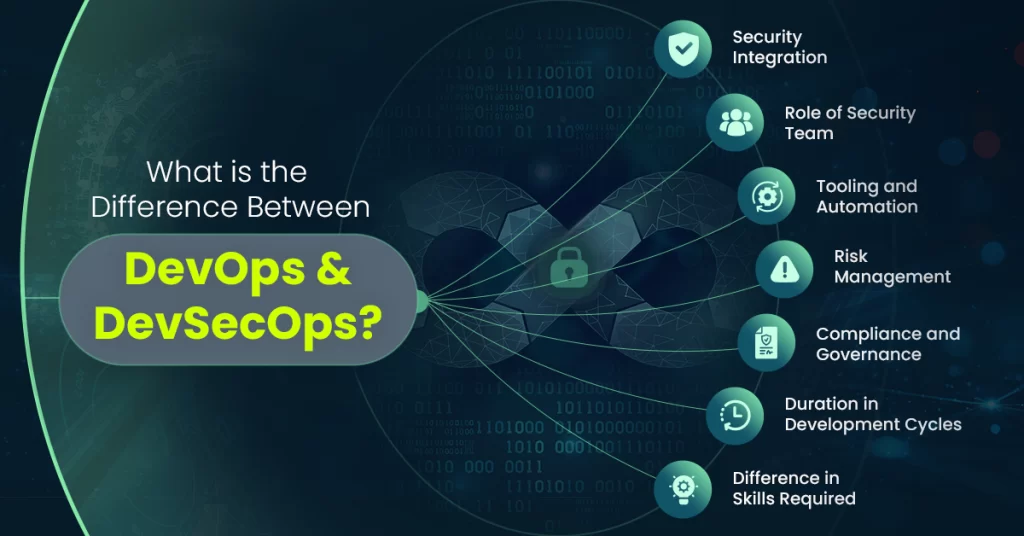
What is the difference between DevOps and DevSecOps?
The key difference between DevSecOps and DevOps lies in the integration of security practices. While DevOps primarily emphasizes the collaboration between development and operations teams to streamline software delivery, DevSecOps extends this approach by integrating security (“Sec”) into every stage of the software development lifecycle, ensuring continuous security testing and fostering collaboration between development, operations, and security teams.
Despite their similar sounding names and similarities, DevOps and DevSecOps also have many differences. Differences between DevOps and devsecops are discussed below.
📌 Security Integration
DevOps focuses on development and operations collaboration. DevSecOps integrates security at every development stage. Unlike DevOps, security is the central element in DevSecOps, and not an afterthought. This ensures a secure development lifecycle from start to finish. Now you understand the differences between DevOps and DevSecops in security integration.
📌 Role of Security Team
In DevOps, security teams are often involved later, only during the final phase of SDLCs. On the other hand, DevSecOps involves security right from the very beginning. All team members share security duties. This approach embeds security in every task. These are the differences between DevOps and DevSecops in the security team.
📌 Tooling and Automation
Both use automation, but DevSecOps adds security tools like SonarQube or Checkmarx. In fact, these tools for security testing and vulnerability scanning are already integrated into the DevSecOps setup. This happens within the CI/CD pipeline and ensures that security checks are automatic and continuous, unlike in DevOps, where they are sporadic and intermittent.
📌 Risk Management
DevSecOps focuses more on managing security risks early. Early risk identification leads to a secure product. On the other hand, DevOps prioritizes operational risks and efficiency over security. DevSecOps, however, aims to minimize security vulnerabilities from the outset. These are the differences between DevOps and DevSecops in risk management.
📌 Compliance and Governance
DevSecOps emphasizes compliance and governance from the start. It aligns development with regulatory needs, which is crucial in regulated industries. However, DevOps does not focus as much on compliance and governance parameters initially. This focus ensures that DevSecOps adheres to data protection laws.
For example, DevSecOps would integrate compliance checks for financial regulations at each stage in a financial app development. However, DevOps might focus on these aspects later in the process, prioritizing speed and collaboration initially. These are the differences between DevSecOps and Devops in compliance governance.
For example, DevSecOps would integrate compliance checks for financial regulations at each stage in a financial app development. But, DevOps might focus on these aspects later in the process, prioritizing speed and collaboration initially.
📌 Duration in Development Cycles
DevOps aims to shorten development cycles for faster deployment. DevSecOps may extend these cycles slightly due to integrated security checks. However, it ensures a more secure product. For example, a web application might take longer to launch with DevSecOps. But, this approach minimizes vulnerabilities right from the start.
📌 Difference in Skills Required
DevOps development services require expertise in both development and operations, while DevSecOps development services demand additional knowledge in security and related practices. DevSecOps team members need to be proficient in secure coding and security testing.
For example, they might be skilled in using security assessment tools like Checkmarx, SonarQube, or Veracode. This expanded skillset in DevSecOps enhances the team’s ability to identify and address security risks early in the development process
Summary of Differences- DevOps vs. DevSecOps
We understand it can be overwhelming to comprehend DevOps vs DevSecOps in one go. So, we have summarized the DevOps and Devsecops differences in the tabular column below.
| Differences | DevOps | DevSecOps | How DevSecOps Benefits Users |
|---|---|---|---|
| Security Integration | Security considered post-development | Security integrated at every stage | Enhances product security, reducing vulnerabilities and potential breaches |
| Role of Security Team | Security teams involved later or in parallel | Security is a shared responsibility from the start | Creates a more secure development environment, ensuring security is a priority throughout |
| Tooling and Automation | Focuses on automation for development and operations | Includes specialized tools like SonarQube for continuous security | Speeds up development while ensuring continuous security checks, leading to reliable and secure software |
| Risk Management | Prioritizes operational risks and efficiency | Emphasizes proactive security risk management | Proactively addresses security risks, contributing to a more secure and stable product |
| Compliance and Governance | May not initially focus on compliance | Prioritizes compliance and governance from the start | Ensures products comply with relevant regulations, protecting user data and privacy |
| Duration in Development Cycles | Aims for shorter development cycles | May slightly extend development cycles for security | While development may take slightly longer, the result is a more secure and robust product |
| Difference in Skills Required | Requires development and operations expertise | Requires additional security knowledge and expertise | Ensures that the team is equipped to address a wide range of security challenges, enhancing overall security |
DevOps vs DevSecOps: Which One Should You Choose?
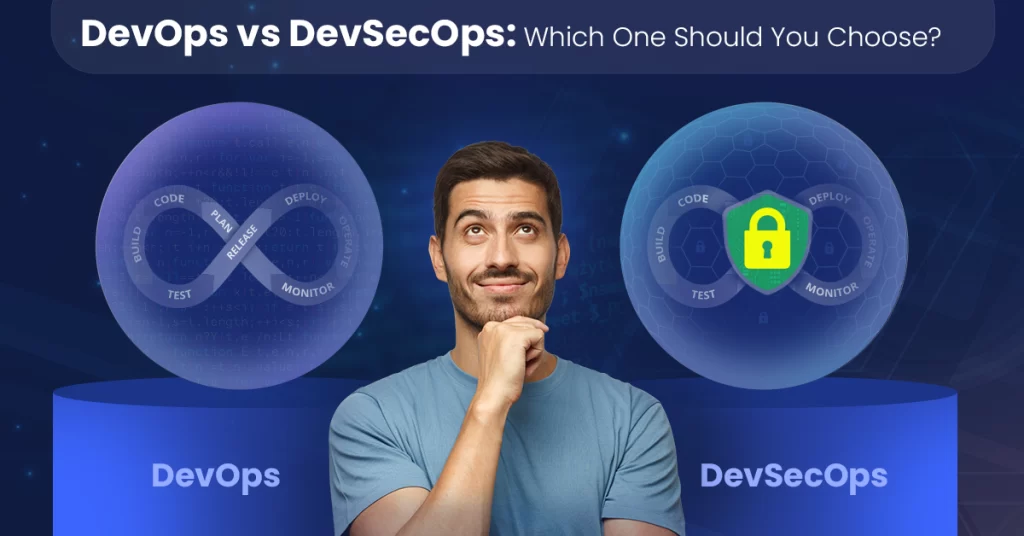
This is perhaps the question that prompted you to come here.
Choosing between DevOps and DevSecOps hinges on your security needs and development pace. DevOps suits teams prioritizing quick software rollouts, making it ideal for fast-paced development environments.
For instance, tech startups might prefer DevOps for its rapid deployment and superior code quality, often partnering with DevOps outsourcing companies to manage these processes efficiently. Security can come later or be integrated separately.
DevSecOps, however, is critical for organizations valuing security from the start. It fits industries like finance or healthcare as these sectors deal extensively with sensitive data and face strict compliance demands.
DevSecOps ensures security is embedded in every step, protecting against breaches. For instance, a financial service would benefit from DevSecOps to safeguard customer information from potential security breaches.
Ultimately, choose the approach that best suits your industry needs. And if you’re looking to partner with reliable DevOps service providers or hire a DevOps engineer, our responsive sales team is ready to help. Operating across major time zones, we ensure you receive a response within 24 hours.


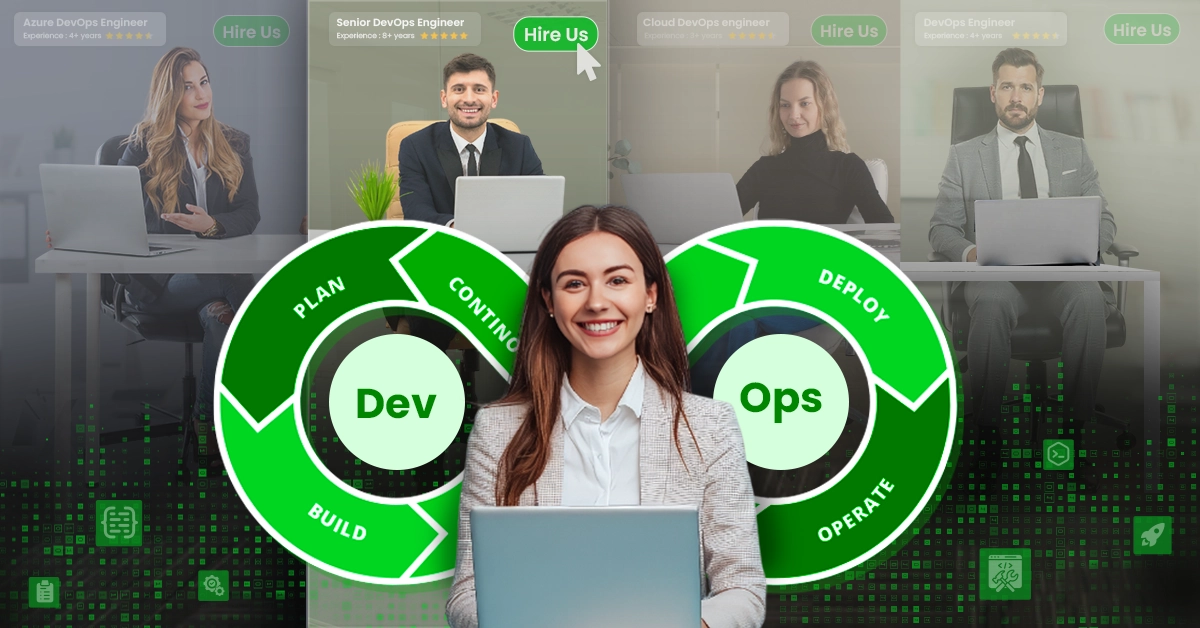
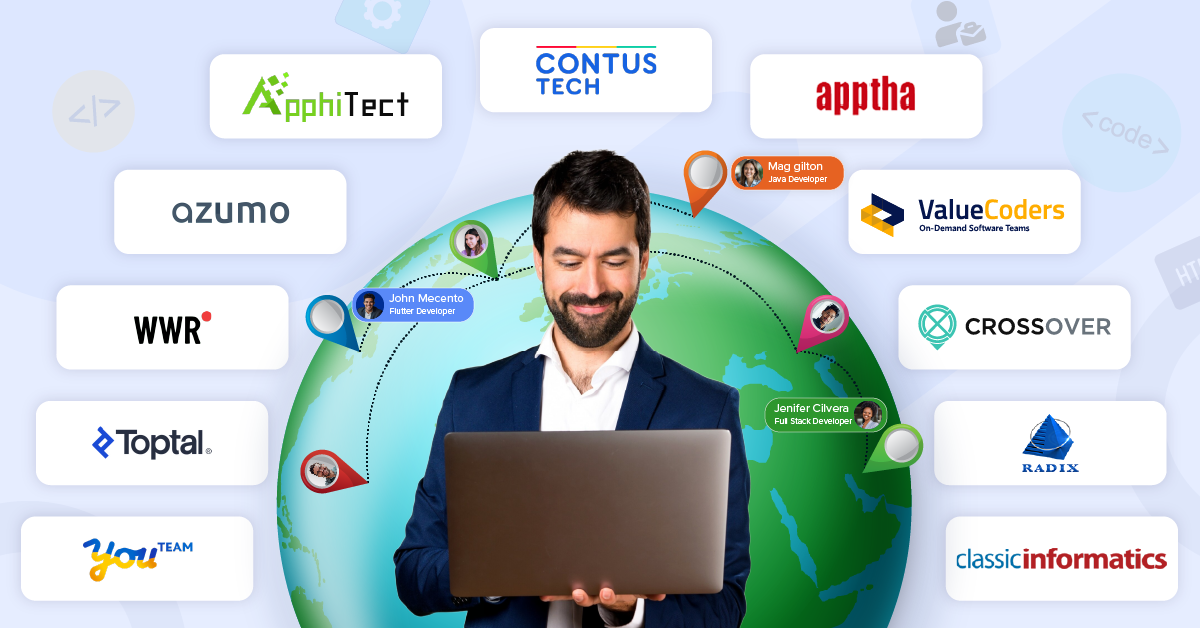
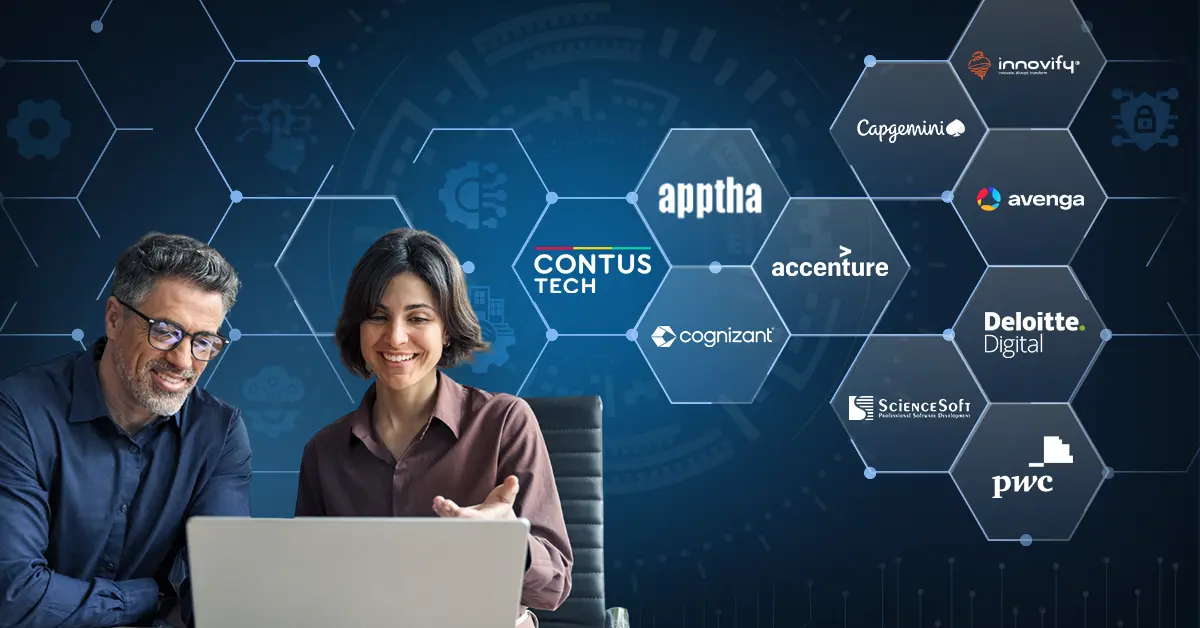
The dynamic interplay between DevOps and DevSecOps is truly fascinating. In our organization, we’re continually exploring ways to synergize these methodologies for a seamless and secure software development lifecycle. It’s not just about speed; it’s about building a foundation that’s both agile and resilient.
In my quest for a DevOps engineer, I’ve come to realize the importance of considering candidates with expertise in DevSecOps. The ability to integrate security into the development pipeline is crucial in today’s threat landscape. A skilled DevOps engineer who understands the significance of DevSecOps principles can help fortify our software against potential vulnerabilities.
As we embark on our hiring journey for our latest project, the integration of DevOps and DevSecOps principles is at the forefront of our considerations. We’re looking for talented individuals who understand the significance of automation, collaboration, and security in the software development lifecycle. Join us in shaping the future of our projects with a DevOps and DevSecOps mindset!
At our company, the journey from DevOps to DevSecOps has been transformative. The added layer of security throughout the development pipeline has become non-negotiable. As we share insights and experiences in our blog, we’re eager to connect with professionals who appreciate the significance of this shift and its impact on creating resilient applications.
Hey there, I want to know how do I go from DevOps to DevSecOps?
Can I let me know in detail about what’s the primary difference between DevOps and DevSecOps?
For my interview purpose i want to know more about in a simple way for fresher interview what is devsecops vs devops?
what does the term devsecops refer to formulation of governance policies to guide development and operational conformance?
Hi, could you please explain me more about How are DevOps and DevSecOps similar?
How can DevSecOps improve my customer experience compared to DevOps?
DevSecOps ensures that security vulnerabilities which are minimized from the outset resulting in a more secure reliable product. This leads to fewer breaches and issues ultimately providing a safer & smoother experience for your customers.
What are the main differences between the DevOps and DevSecOps?
The main difference between the DevOps and DevSecOps is the integration of security. While DevOps focuses on the development and operations collaboration. Where DevSecOps incorporates security into every stage of the development lifecycle and ensuring the continuous security checks.
Why would a company choose DevSecOps over DevOps?
Companies have to handle most sensitive data or facing strict compliance requirements like those in finance or healthcare should choose DevSecOps. It ensures security is integral from the start, reducing vulnerabilities & enhancing overall protection.
What is the difference between DevOps and DevSecOps in terms of team structure?
In DevOps security is often a separate team brought in later. In DevSecOps security becomes everyone’s responsibility from the start, fostering closer collaboration between the development, operations and security teams.
How does DevSecOps improves the security when compared to DevOps?
DevSecOps improves the security by submerge it into each phase of development. This proactive approach will identifies & mitigates security risks early like DevOps which often handles security as a separate, later phase.
How do I maintain the fast deployment speeds with DevSecOps?
Automation is the key. Use automated security tools within your CI/CD pipeline to run continuous security checks without slowing down the deployments. This approach balances the speed and security ensuring quick rollouts with minimal vulnerabilities.
Can you explain how the automation differs between DevOps and DevSecOps?
Both use automation but DevSecOps integrates security tools like SonarQube within the CI/CD pipeline. This continuous security automation difference with DevOps where security checks are often less frequent and not as deeply implanted.
What skill sets are required for the DevSecOps that will differ from DevOps?
DevSecOps team needs the additional security expertise. They must understand to secure coding and use security tools like Checkmarx. This skill set helps to address security challenges more effectively than in a particular DevOps setup.
Can I adopt DevSecOps practices in phases or should it be an all-or-nothing approach?
Adopting DevSecOps can be done in phases. Start by integrating the security testing in the early stages of your SDLC and gradually expand security practices across all the phases. This phased approach minimizes the disruptions while enhancing security.
How does the role of security teams differs in DevOps vs DevSecOps?
In DevOps security teams typically get involved late in the process. In DevSecOps security is a shared responsibility from the beginning with all the team members contributing to security tasks throughout the development process.
What impact does DevSecOps have on the development cycles compared to DevOps?
DevSecOps might slightly extend development cycles due to the integrated security checks. But however this results in a more secure product reducing the risk of vulnerabilities and breaches.
What additional skills would my DevOps team need to adapt to the DevSecOps?
Your team will need to develop the expertise in security practices including secure coding, vulnerability scanning and compliance management. Investing in security training & certifications will help them smoothly transition to DevSecOps.
Will shifting from DevOps to DevSecOps will slow down my software releases?
DevSecOps might be slightly extend development cycles due to the integrated security checks but it ensures a more secure product. The slight delay is worth the reduction in the vulnerabilities and the peace of mind from knowing your software is secure.
Is continuous monitoring important in both DevOps and DevSecOps?
Yes, continuous monitoring is important in both. It helps to maintain the system health and security by quickly identifying and addressing the issues though DevSecOps, which places a stronger role on security monitoring.
How does DevSecOps ensures compliance better than the DevOps? Actually my industry faces strict regulations.
DevSecOps integrates compliance checks from the start which ensuring adherence to regulations throughout the development lifecycle. This proactive approach will reduces the risk of non-compliance and penalties compared to the traditional DevOps practices.
How do DevOps and DevSecOps handle compliance and governance?
DevSecOps prioritizes compliance and governance from the start for ensuring the alignment with regulatory needs throughout the development. DevOps might focus on these aspects & later emphasize speed and collaboration initially.
Is the transition from DevOps to DevSecOps is expensive? Should I have to worry about costs?
Transitioning to DevSecOps might involve upfront costs for the new tools & training. However the long term benefits of enhanced security, reduced breaches and compliance make it a worthwhile investment especially in the regulated industries.
How do I decide whether to stick with the DevOps or shift to the DevSecOps for my fintech company?
For fintech where the security & compliance are crucial, shifting to DevSecOps is ideal. It will embeds the security into every stage reducing risks from the outset. DevOps might be faster but DevSecOps ensures your sensitive data stays protected.
What’s the best way to transition my existing DevOps setup to DevSecOps without disrupting current operations
Start by integrating the security tools into your existing CI/CD pipeline. Gradually train your team for secure coding practices & shift security testing earlier in the development process. This phased approach minimizes the disruptions.